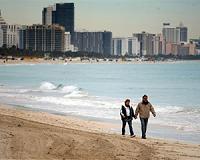| . |  |
. |
Corvallis, Ore. (UPI) Jan 26, 2009 U.S. scientists say they've found a dramatic increase in maximum ocean wave heights forming off the Pacific Northwest, possibly caused by climate change. Oregon State University researchers, joined by scientists from the Oregon Department of Geology, say the wave height increase is forcing a re-evaluation of how high a "100-year event" might be, and the new findings raise special concerns for flooding, coastal erosion and structural damage. The study, led by Assistant Professor Peter Ruggiero, concludes the highest waves might be as high as 46 feet, up 40 percent from estimates of only 33 feet made as recently as 1996. "The rates of erosion and frequency of coastal flooding have increased over the last couple of decades and will almost certainly increase in the future," Ruggiero said. "The Pacific Northwest has one of the strongest wave climates in the world, and the data clearly show that it's getting even bigger. "Possible causes might be changes in storm tracks, higher winds, more intense winter storms or other factors. These probably are related to global warming, but could also be involved with periodic climate fluctuations such as the Pacific Decadal Oscillation, and our wave records are sufficiently short that we can't be certain yet. But what is clear is the waves are getting larger." The findings are detailed in the journal Coastal Engineering.
Share This Article With Planet Earth
Related Links Water News - Science, Technology and Politics
 Cold decimates Florida saltwater fish
Cold decimates Florida saltwater fishMiami (UPI) Jan 19, 2009 It could take coastal snook and other saltwater game fish years to rebound from Florida's record-setting cold snap this month, officials said. "I haven't see a swimming snook in 10 days," Everglades guide Benny Blanco said. "All I have seen is floating (dead) snook." State wildlife officials reported the fish kills were widespread in Florida's bays and channels, The Miami Herald ... read more |
|
| The content herein, unless otherwise known to be public domain, are Copyright 1995-2009 - SpaceDaily. AFP and UPI Wire Stories are copyright Agence France-Presse and United Press International. ESA Portal Reports are copyright European Space Agency. All NASA sourced material is public domain. Additional copyrights may apply in whole or part to other bona fide parties. Advertising does not imply endorsement,agreement or approval of any opinions, statements or information provided by SpaceDaily on any Web page published or hosted by SpaceDaily. Privacy Statement |